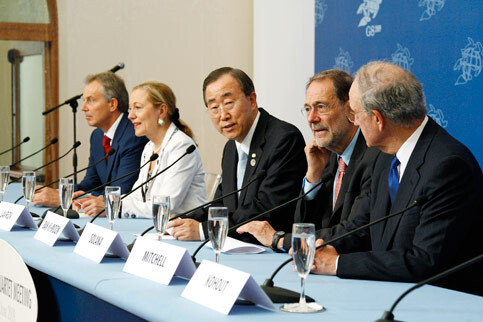The Electronic Intifada 29 July 2009

EU foreign policy chief Javier Solana (second from right) at a joint press conference with the Middle East Quartet (US, EU, Russia, and UN), June 2009. (Mark Garten/UN Photo)
European Union foreign policy chief Javier Solana surprised observers on 11 July when he called, during a speech in London, for the UN Security Council to recognize a Palestinian state by a certain date even if no agreement had been reached between Israelis and Palestinians.
On its face, this proposal sounds dramatic. There must be some who still believe that a Security Council decision would result in real and drastic action. The reality, however, is that the Security Council is not the powerful executive organ it was created to be.
Yet Solana clearly angered Israel by daring to make such a proposal. Israel is not used to being surprised, and normally the big powers consult it before making any major statements about the Middle East situation. This time it seems Solana did not seek the proper Israeli permission. Yet the Israeli anger itself seemed to give added credence to the idea that Solana must have said something significant.
Solana praised the new peace initiative of US President Barack Obama and suggested that if that fails to bring about a binding agreement between the parties, then the “international community” should intervene through the Security Council. Specifically, Solana proposed:
“After a fixed deadline, a UN Security Council resolution should proclaim the adoption of the two-state solution. This should include all the parameters of borders, refugees, Jerusalem and security arrangements. It would accept the Palestinian state as a full member of the UN, and set a calendar for implementation. It would mandate the resolution of other remaining territorial disputes and legitimize the end of claims.”
What this seemingly bold statement boils down to is that Solana wants the Security Council to join the chorus of those who have been singing the two-state solution song for decades. Instead of suggesting concrete measures to enforce previous and long-ignored UN resolutions, or to check Israel’s violations which made a Palestinian state impossible, Solana simply wants the UN to recognize an imaginary Palestinian state as a full member of the UN.
If we try to put a positive spin on it, we could say that the “two-state solution” is already half way to being achieved. After all, one of the two states — Israel — has been in existence for more than 60 years, and moreover has been expanding its territory for all that time.
The problem, however, is that this “success” means that there is nowhere left for a second state. Solana, like many others, finds it easy to parrot the two-state solution, but does not have the courage to demand a complete end even to the Israeli occupation of the West Bank and Gaza Strip which began on 4 June 1967.
Having himself been such a key part of the failed peace process, Solana now wants the Security Council to “mandate” a resolution of central issues — borders, refugees, Jerusalem, settlements and security arrangements. He does not say how the UN would do this but merely throws it to them as if these matters are minor details.
Indeed, Solana could have recognized that the UN — the Security Council in particular — has already dealt with these matters. Hasn’t the Security Council decided repeatedly that all of Israel’s settlements beyond the line of 4 June 1967 are illegal and should be removed? Hasn’t it declared that Israel’s annexation of occupied East Jerusalem and the Golan Heights is null and void as are all legal and administrative changes made in these territories by Israel? Hasn’t the Security Council declared clearly and repeatedly that Israel’s efforts to change the demographic composition of the Occupied Palestinian Territories are totally illegal and invalid?
Given that all this is the case, and the Security Council never once moved to enforce its own resolutions violated by Israel, why should its intervention matter now? If anything — and this is likely why Solana is shy to say exactly what the Security Council should do — he wants it to endorse fake solutions which legitimize illegality. For example, a UN resolution canceling the right of return, recognizing existing settlements, imposing on Palestinians a bantustan instead of state, and probably also mandating NATO or other international forces to occupy the state, as is the case in several Balkan countries created under Solana’s stewardship.
There is no guarantee that Israel would comply with even such a resolution that endorses most of its demands. What would happen then? Is Solana proposing that the Security Council develop a backbone, that it enforce its own resolutions with sanctions against Israel? If so, that would be welcome of course, but the test is to enforce the existing resolutions which Israel and Solana, along with the rest of the peace process industry have ignored and undermined for so long.
It might have made some sense if Solana suggested that the Security Council recognize a Palestinian state in all of the West Bank and Gaza Strip, including East Jerusalem, on the borders exactly as they were on 4 June 1967. That would have signaled an intent to reinforce existing international law and bring an end to the illegal colonial occupation which the EU has subsidized and politically covered for so long.
Instead, Solana seems to be calling for the UN to endorse vague ideas and start again an entire process that has proven totally misguided and fruitless. The real worry, however, is that Solana, who has always taken his political cues from Washington, is launching a trial balloon. He may be proposing a course of action to save the Obama administration from the failure of the process being conducted by US Middle East envoy George Mitchell.
It is not far-fetched to imagine the United States, which effectively controls the Security Council, proposing a resolution embodying Solana-like ideas, and packaging this as being part of a new US commitment to international joint action and legitimacy. The Palestinians will be presented with a fait accompli where they will be told that any demands for the their legitimate and inalienable rights beyond what the resolution contains are now invalid.
Passing such a resolution, and calling it Middle East “peace” would mark a new low in the UN’s abdication of its responsibilities. It would be the diplomatic equivalent of hanging up a banner declaring “Mission Accomplished” at the beginning of a long and disastrous war.
Hasan Abu Nimah is the former permanent representative of Jordan at the United Nations. This essay first appeared in The Jordan Times and is republished with the author’s permission.




